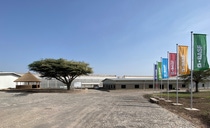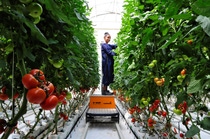New production facility in Ethiopia
First vegetable seeds grown in BASF’s new state-of-the-art production facility in Ethiopia enter the global market
Customers worldwide to benefit from year-round seed production
Around €8 million investment
Numerous social responsibility initiatives to benefit the local community
Nunhem, The Netherlands
The first seeds produced at BASF’s new state-of-the-art production facility in Ethiopia enter the global vegetable seed market. Located in the country’s Amhara region, the facility offers ideal year-round production conditions for sweet pepper, tomato and cucumber. It is BASF’s first high-tech greenhouse complex in Africa.
“We invested around €8 million into this new facility. It will provide us with extra supply reliability and flexibility to serve our customers worldwide,” said Vicente Navarro, Senior Vice President of BASF’s vegetable seeds business. “Sustainable food production is very important to us and we want to do our part. That is why we are very proud of this new facility: It makes us a frontrunner in terms of establishing the first sustainable high-tech seed production site in Ethiopia with fully automated processes for climate control including humidity, heating and irrigation.”
The premises cover a surface of 15 hectares: two hectares are occupied by
state-of the-art greenhouses while the rest is used for open field seed production facilities and infrastructure. Currently, around 70 permanent employees are working at the new site. In addition, BASF also provides employment to more than 100 seasonal workers. Most of the employees were recruited from the surrounding areas and trained in-house.

High sustainability standards and commitment to social responsibility
The site fulfills BASF health, safety and environmental standards and goes beyond Ethiopia’s common sustainability requirements. To reduce its carbon footprint, mainly renewable energy sources are used to generate electricity. The greenhouses are heated with solar panels. Furthermore, the facility has its own wastewater treatment plant and all the waste it produces can be recycled on site.
In addition, BASF is engaged in numerous social responsibility initiatives in the vicinity of the site. “I am very proud to see that apart from delivering seeds to Ethiopian smallholder farmers, we are also actively involved in projects for reforestation and soil erosion control in the area,” stressed Ben Depraetere, Managing Director Nunhems Ethiopia PLC and Country Head of BASF’s vegetable seeds business in Ethiopia. “We want the local community to benefit. That is why, for example, we also supply the community around our site with safe drinking water, have invested in building new road infrastructure and established a fund to create job projects for unemployed young people from the surrounding area.”


